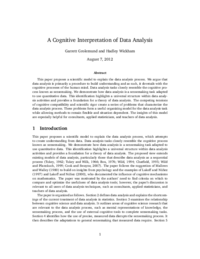A Cognitive Interpretation of Data Analysis

- A Cognitive Interpretation of Data Analysis.
- International Journal of Statistics, vol. 82, no. 2, pp. 184–204, 2014.
Download: pre-print
This paper proposes a scientific model to explain the data analysis process. We argue that data analysis is primarily a procedure to build understanding and as such, it dovetails with the cognitive processes of the human mind. Data analysis tasks closely resemble the cognitive process known as sensemaking. We demonstrate how data analysis is a sensemaking task adapted to use quantitative data. This identification highlights a universal structure within data analysis activities and provides a foundation for a theory of data analysis. The competing tensions of cognitive compatibility and scientific rigor create a series of problems that characterize the data analysis process. These problems form a useful organizing model for the data analysis task while allowing methods to remain flexible and situation dependent. The insights of this model are especially helpful for consultants, applied statisticians, and teachers of data analysis.
@Article{sensemaking,
author = {Garrett Grolemund and Hadley Wickham},
journal = {International Journal of Statistics},
number = {2},
pages = {184–204},
title = {A Cognitive Interpretation of Data Analysis},
volume = {82},
year = {2014},
}